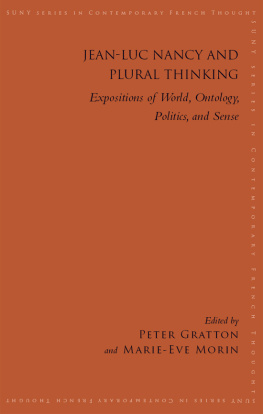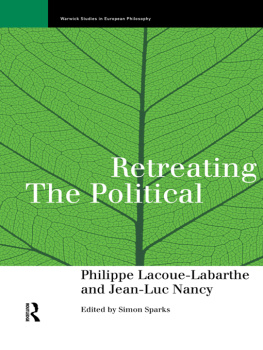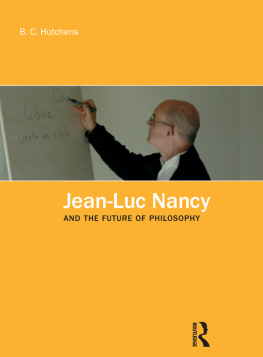Nancy Jean-Luc - Philosophical Chronicles
Here you can read online Nancy Jean-Luc - Philosophical Chronicles full text of the book (entire story) in english for free. Download pdf and epub, get meaning, cover and reviews about this ebook. City: New York, year: 2008, publisher: Fordham University Press, genre: Religion. Description of the work, (preface) as well as reviews are available. Best literature library LitArk.com created for fans of good reading and offers a wide selection of genres:
Romance novel
Science fiction
Adventure
Detective
Science
History
Home and family
Prose
Art
Politics
Computer
Non-fiction
Religion
Business
Children
Humor
Choose a favorite category and find really read worthwhile books. Enjoy immersion in the world of imagination, feel the emotions of the characters or learn something new for yourself, make an fascinating discovery.

- Book:Philosophical Chronicles
- Author:
- Publisher:Fordham University Press
- Genre:
- Year:2008
- City:New York
- Rating:4 / 5
- Favourites:Add to favourites
- Your mark:
- 80
- 1
- 2
- 3
- 4
- 5
Philosophical Chronicles: summary, description and annotation
We offer to read an annotation, description, summary or preface (depends on what the author of the book "Philosophical Chronicles" wrote himself). If you haven't found the necessary information about the book — write in the comments, we will try to find it.
Philosophical Chronicles — read online for free the complete book (whole text) full work
Below is the text of the book, divided by pages. System saving the place of the last page read, allows you to conveniently read the book "Philosophical Chronicles" online for free, without having to search again every time where you left off. Put a bookmark, and you can go to the page where you finished reading at any time.
Font size:
Interval:
Bookmark:
Philosophical Chronicles
Series Board
Francis J. Ambrosio
Michael D. Barber
Jeffrey Bloechl
Ilse N. Bulhof
Thomas W. Busch
Trish Glazebrook
Kevin Hart
Karl Jaspers
Richard Kearney
James H. Olthuis
Michael Strawser
James Swindal
Mark C. Taylor
Edith Wyschogrod
Philosophical Chronicles
These eleven chronicles were broadcast on the radio between September 2002 and July 2003, on the last Friday of each month, as part of France Cultures program Philosophy Fridays. The broadcast was directed, on behalf of the Collge International de Philosophie, by Franois Noudelmann, whom I thank for his invitation.
The texts published here correspond almost exactly to the texts that were actually delivered (and recorded for the Web site and the archives of France Culture). In each case, the context of speech led to some improvisation; some of these changes were written down and are reproduced here, others remain only in the spoken version.
The musical accompaniment for the chronicles, suggested by Franois Noudelmann, was the aria In lagrime stemprato il cor qui cade, from Antonio Caldaras Maddalena ai piedi di Cristo.
Some of these chronicles have been published in several issues of Rue Descartes, the journal of the Collge International de Philosophie.
JEAN-LUC NANCY
Translated by Franson Manjali

Copyright 2008 Fordham University Press
All rights reserved. No part of this publication may be reproduced, stored in a retrieval system, or transmitted in any form or by any meanselectronic, mechanical, photocopy, recording, or any otherexcept for brief quotations in printed reviews, without the prior permission of the publisher.
Philosophical Chronicles was originally published in French as Chroniques philosophiques, by Jean-Luc Nancy, Copyright ditions Galile, 2004.
Library of Congress Cataloging-in-Publication Data
Nancy, Jean-Luc.
[Chroniques philosophiques. English]
Philosophical chronicles / Jean-Luc Nancy ; translated by
Franson Manjali.
p. cm.(Perspectives in continental philosophy series)
Includes bibliographical references.
ISBN-13: 978-0-8232-2758-7 (pbk. : alk. paper)
1. Philosophy, Modern21st century. I. Title.
B792.N3513 2008
194dc22
2007046913
This work has been published with the assistance of the French Ministry of CultureNational Center for the Book.
Ouvrage publi avec le concours du Ministre franais charg de la cultureCentre National du Livre.
This book, comprising texts of monthly talks or chronicles presented over a period of eleven months on France Culture radio, connects up philosophy with several nodes of contemporary life. The chronicles of an old disciplineperhaps the oldest living disciplinecannot but relate the chronic problems and crises it faces in its very act of survival. Though philosophys very existence depends on its being unconditioned, in its course of development, philosophers tend to submit it to various conditionalities, including a cultural conditionality that is much in vogue today. However, philosophy lives and survives its crises by continually withdrawing itself from all given conditionalities, without ever being able to hook itself onto any permanent notion of the unconditioned. The rhythm or the pulsation of philosophy always takes it outside of itself, opens it toward what Nancy calls the time of thought, where it encounters the absolutely non-given. These chronicles point to a chronic opening up of philosophy toward the undecidable time to come.
The movement toward an unknown exterior that philosophy requires today is not merely of a temporal kind. Behind the current crisis (certainly not a clash, as it is claimed) of civilizations manifest in unprecedented religious and nationalist fervors or global capitalist maneuverings, Nancy identifies the aging of a culture of autonomy. As the autonomous form of life and the associated auto-motive techniques of this culture are approaching senility, philosophy may well suggest the reinvention of an entire mode of existence. Exonomy is the name that Nancy gives to this alternative law or mode of existence, distinct from heteronomy but conceptually akin to exogamy. The space of exonomy is outside the space of both self and other; it is an in-between space, always not yet given.
If philosophy can guide us into another time and another space, what, then, is it to life? Is philosophy a part of it, or outside? Does it guide the conduct of life or stand aloof as a conceptual guide? Is it of the order of actions or of reasons? All such questions and the tensions to which they give rise are internal to philosophy, according to Nancy, making philosophy something like an intimate form of life. It is not, however, a prior form, available either transcendentally or empirically, but it appears out of life itself as its possible formation. Philosophy inserts itself into and emerges from the space of discourses already given, whether of religion, of the quotidian, or of politics, science, or art; it is the spacing of these discourses. As spacing, its sense exceeds every given sense, not only in and of life, but even in death, and of death.
The question of philosophys response to religionone of the most ancient and most profound aspects of civilizational existenceis posed in the context of the renewed war cries in the name of religion in the contemporary world. Nancy analyzes the problem in terms of the very character of monotheism: in the name of a single and all-encompassing god, it abandons man to solitude in a state of godlessness. And then it seeks to gather these abandoned human beings into the totality and universality of a newly found truth. Even while colonial expansions and conquests are undertaken in the name of truth, the bogus assurance of religious salvation is still held forth, only reinforcing mans abandonment. Such is the context that demands a deconstruction of monotheism, in order to extract what is repressed in it, denied by it, and left outside its own totality.
The decline of the meaning of the word politics is not of a different kind. In the politically charged world of today, where every sphere of life has necessarily become political, nothing is seriously discerned as political, except in an overused sense of the word. The current critical sense of the word political, Nancy notes, was introduced recently in our languages, in order to understand the process behind what used to be considered the art of politics. In order to retrieve the specificity of a contemporary art of politics, we might well have to retreat from the current totalitarian notion of politics, as applying everywhere at all times.
The best example of a major philosopher going astray in his understanding of the conjunction between politics and history is Heidegger. Between politics call for justice, and historys call for action, where have philosophers, at least since Hegel, put their stakes? And with what consequences? Can the mechanism of history and the affirmation of its struggle, perceived from the given position of the philosopher, usher in justice without subjecting the other to the will of the self? On this question foundered, not only Heidegger the reactionary, but perhaps various Marxisms too, though in different ways. How can the necessity of a politics of justice cope with the unfolding of historical events?
Historys everyday events are even more difficult to interpret in a philosophical or political sense. Philosophers dilemma, that is, when they have to deal with the everyday, is in deciding whether mundane daily events are to be inscribed into a higher level ofphilosophical, historical, political, or aestheticsense, or left as insignificant. Though on occasion one can make some everyday events appear, nonappearance is the essential mode of the everyday. It vascillates between hiding in the open and chance appearances in creative works. Yet now and then the everyday makes an unintended appearance in catastrophic and mortal events, such as earthquakes and wars. It is in such situations that an unmarked life is in silent contact with the nonapparent lives of all those who are living and dead, without this event ever rising beyond the level of everyday appearance.
Next pageFont size:
Interval:
Bookmark:
Similar books «Philosophical Chronicles»
Look at similar books to Philosophical Chronicles. We have selected literature similar in name and meaning in the hope of providing readers with more options to find new, interesting, not yet read works.
Discussion, reviews of the book Philosophical Chronicles and just readers' own opinions. Leave your comments, write what you think about the work, its meaning or the main characters. Specify what exactly you liked and what you didn't like, and why you think so.




